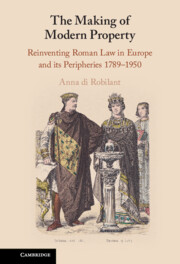Book contents
- The Making of Modern Property
- The Making of Modern Property
- Copyright page
- Dedication
- Contents
- Acknowledgments
- Introduction
- 1 What Roman Antiquity Had to Offer
- 2 The Foundations of Romanist-Bourgeois Property
- 3 Crafting Romanist-Bourgeois Property
- 4 Reform, Not Revolution
- 5 The Tensions of Absolute Property
- 6 Roman Dominium in the Republics of Latin America
- 7 The Social Critics
- Conclusions
- References
- Index
Conclusions
Published online by Cambridge University Press: 13 July 2023
- The Making of Modern Property
- The Making of Modern Property
- Copyright page
- Dedication
- Contents
- Acknowledgments
- Introduction
- 1 What Roman Antiquity Had to Offer
- 2 The Foundations of Romanist-Bourgeois Property
- 3 Crafting Romanist-Bourgeois Property
- 4 Reform, Not Revolution
- 5 The Tensions of Absolute Property
- 6 Roman Dominium in the Republics of Latin America
- 7 The Social Critics
- Conclusions
- References
- Index
Summary
The Romanist-bourgeois property tradition that eased the advance of liberal capitalism in nineteenth-century Europe remained dominant throughout the twentieth century, despite its obvious shortcomings. Surprisingly, its influence seems only to be growing, even among the most sophisticated property theorists in the United States. Several of the centerpieces of Romanist-bourgeois property have made a spectacular comeback. Henry Smith and Thomas Merrill have repurposed the Roman conceptual architecture of property centered on dominium and the right to exclude. While the right to exclude by no means captures every relevant attribute of the institution of property, giving individuals the right to exclude others from particular resources is a cost-effective way of organizing the management and control of resources in society and one that also promotes a variety of other ends, including, willingness to share resources.744 Novel theories of abuse of rights continue to resurface and to spark controversy. Larissa Katz has recently proposed a principle of abuse of rights focused on owners’ reasons for action.745 Because owners’ power to make authoritative decisions about the use of resources inevitably threatens the autonomy interests of others, the exercise of this authority over others is legitimate only if owners have can present a worthwhile agenda for the resource. Critics have noted the limited use of this account of abuse of property rights that merely scrutinizes the owners’ reasons and have proposed a more capacious, anti-domination principle of abuse of rights.746 The social function of property has also experienced a similar revival with Gregory Alexander, who, in a foundational essay, courageously implied a broad social obligation norm in US property law, one that is not limited to curbing owners’ powers but goes as far as foregrounding the place of nonowners and requiring redistributive intervention.747 Alexander’s piece proved highly influential, sparking a rich conversation about the merits and limits of the social function of property in property circles in the United States.
- Type
- Chapter
- Information
- The Making of Modern PropertyReinventing Roman Law in Europe and its Peripheries 1789–1950, pp. 322 - 326Publisher: Cambridge University PressPrint publication year: 2023



